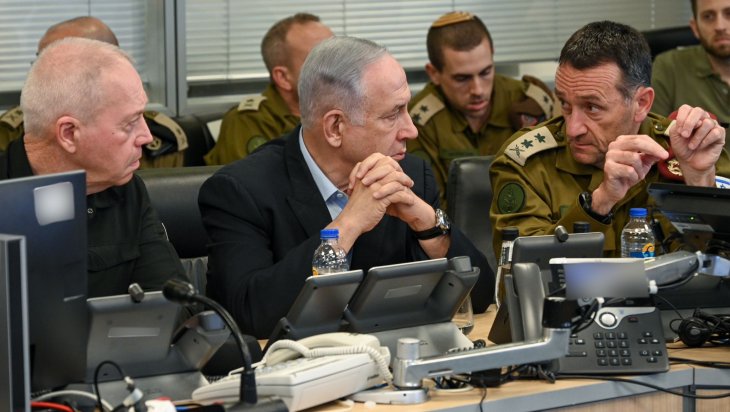A Failure Not Just for Halevi, But Also for Netanyahu, Eisenkot, and Kochavi

Introduction
Israel’s Chief of Staff Herzi Halevi announced on 24 January 2025 that he would resign on 6 March, citing responsibility for the security failures of the 7 October attacks. Shortly afterward, the commander of the Southern Command, Yaron Finkelman, also declared his intent to resign for the same reason, though without specifying a date. While these resignations appear to be directly linked to the failures of 7 October, they also reflect a deeper rift between the government and the upper echelons of the Israeli military. This divide spans a range of issues, including the recently revived judicial overhaul, the Gaza war, and broader strategic objectives.
At its core, this conflict stems from two key dynamics: first, the far-right government’s ambition to reshape Israel’s security and judicial institutions; second, the political leadership’s attempt to deflect responsibility for the 7 October failure onto bureaucratic bodies with limited public communication channels. Notably, Halevi’s decision to resign before the fragile ceasefire process enters its second phase—and his call for a comprehensive investigation—suggests that his departure is not merely about personal accountability. Instead, it highlights the broader issue of political leaders refusing to take responsibility for their role in the crisis. Given these developments, it is likely that resignations may extend beyond the military to other security institutions, particularly Shin Bet.
The political leadership’s role in the intelligence breakdown
One of the most striking aspects of this failure was the Israeli political leadership’s overconfidence in its assumption that Hamas had been deterred. National Security Advisor Tsachi Hanegbi even publicly asserted that Hamas was no longer a threat—an assessment that likely contributed to intelligence agencies underestimating the risk. Reports also indicate that warnings from Egypt were overlooked due to Israel’s focus on tensions with Hezbollah in the north and increasing instability in the West Bank since 2022. The intelligence failure of 7 October, given the central role intelligence plays in Israel’s military doctrine, has directly impacted the effectiveness of the Gaza operation in its aftermath. In this context, shortcomings in threat assessment, intelligence gathering, and analytical failures within intelligence agencies did not merely enable the initial breach but also undermined Israel’s ability to advance in Gaza in its aftermath. Going forward, discussions about military doctrine and reforms must be understood in direct relation to these intelligence failures, highlighting their interconnected nature.
Military reforms and unfinished strategies
Since the 2006 Lebanon War, the Israeli army has undergone three major reform initiatives, two of which were implemented under former military chiefs, Gadi Eisenkot —who is now aligned with Benny Gantz in the National Unity Party— and Aviv Kochavi. These reforms aimed to build a more mobile, intelligence-driven force capable of fighting on multiple fronts, particularly in asymmetric warfare scenarios. The restructuring of army ground forces was primarily a response to the shortcomings of 2006, where Israel’s ground operations struggled to achieve decisive success. Despite these reforms, however, Israel has yet to fully neutralise the threats from either Hezbollah or Hamas. In both cases, high-precision, intelligence-driven operations have been emphasised, yet the actual results remain limited. For instance, while Hezbollah’s leadership has been severely weakened through targeted operations, Israeli forces have struggled to push beyond a 5-10 km depth in ground offensives. In Gaza, the objective of completely dismantling Hamas has not been achieved, and intelligence failures have prolonged Israel’s struggle for operational control.
Tensions between the military and Netanyahu’s government
Halevi assumed office on 16 January 2023, just as the country was engulfed in political turmoil over Netanyahu’s judicial overhaul. His tenure was not just about managing security challenges; it also involved navigating the impact of deep societal divisions affecting the military. During this period, Israel witnessed one of its largest protest movements, with tens of thousands of demonstrators taking to the streets every Sunday until 7 October. This societal polarisation extended into the military, with reservists refusing to participate in training exercises. Numerous warnings were issued about the impact of these divisions on national deterrence, but Netanyahu’s government largely ignored them. Even before the dissolution of the War Cabinet, Halevi and the upper echelons of the military were able to navigate decision-making processes more smoothly, largely due to former Israeli Defence Minister Yoav Gallant’s role as a bridge between the sides. However, the dissolution of the War Cabinet, followed by Gallant’s dismissal, further weakened Halevi’s position and made communication between the parties more difficult. Thereafter, Halevi clashed with Netanyahu over key aspects of the war in Gaza, including its operational goals and the question of who would govern Gaza after Hamas. Meanwhile, Israel’s relatively successful operations against Hezbollah in the north were politically credited to Netanyahu rather than the military. Halevi also became a target of the Netanyahu family, facing accusations of undermining the government—going as far as being labelled a potential coup plotter. These attacks further illustrate how the government has sought to shift blame onto military leadership.
Conclusion: A political reckoning ahead?.
The resignations of Halevi and Finkelman suggest that the Netanyahu government is using military leadership as scapegoats to shield itself from responsibility. Halevi, in particular, operated under the strategic legacy of Eisenkot and Kochavi, as well as the political framework set by Netanyahu’s cabinet, which insisted that Hamas had been successfully deterred. His share of the blame in the 7 October failure is no greater than that of his predecessors or political decision-makers. As the resignation process unfolds, it is likely that the Israeli public will demand greater transparency regarding both the war effort and the government’s failures leading up to 7 October. Regardless of how these events play out, Israel’s political landscape is set to face even greater polarisation, crises, and internal disputes in the coming months.






